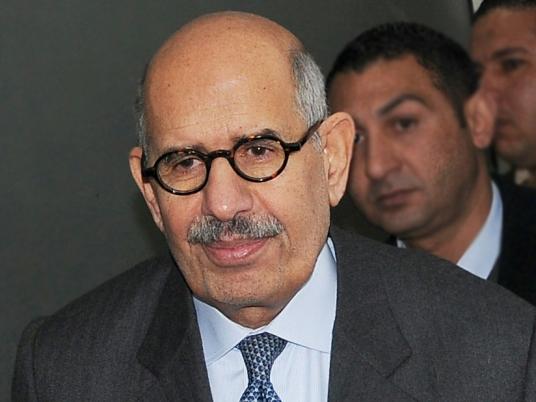It is perhaps apposite that the Dostour — “constitution” — Party is cutting its teeth on the political battle surrounding the document for which it is named.
As party steering committee member Ahmed Hawary explains, “Every party in the world has its signature fights. If the fight for our Constitution isn’t our fight, then what is?”
But even if the Constitution that the party stood against has been passed with a 63.8 percent majority vote, in a referendum with a turnout of a little less than 33 percent, for the Dostour Party, the fight continues. The party revolves around a shift in political engagement that was associated with reform leader Mohamed ElBaradei shortly before the 25 January revolution, and is often self-described as transcending ideology.
Most importantly, the party considers the street a locus for its mission.
“Mohamed ElBaradei started the revolution,” party member Mostafa Salam declares. His friend, Gamal Saber, also a Dostour activist, is similarly enthused about the ex-diplomat turned opposition figure, who three months ago declared the establishment of the party, of which he is president.
Both Salam and Saber traveled all the way from Aswan to take part in a sit-in in Tahrir Square last November, a week after President Mohamed Morsy’s unilateral constitutional declaration claiming more powers for himself.
The party’s insignia, a minimalist tree above its slogan of “bread, freedom and social justice” — a key revolutionary slogan — fluttered on the flags carried by marchers entering the square.
ElBaradei is “the only leader with untarnished integrity” who “remains constant while everyone else is failing,” says Hawary, reiterating that in a political context where credibility is scarce, the Dostour Party becomes a comfort zone.
Saber says that the first time he got involved in street politics was as part of the Movement for Change ElBaradei began in 2010. Back then, ElBaradei had returned from abroad, welcomed by thousands of youth thirsty for change, and embarked on a reform campaign that reactivated the dormant street at the time.
Saber points to his gang.
“Those three work in a sugar factory. He’s a Christian. He’s a Muslim. All sections of society are attracted to Dostour.”
Hawary describes his party as “post-ideological.” He says it “represents the revolution.”
“The revolution was the people’s attempt to take matters into their own hands. Our job is to regulate this vision,” Hawary says.
But Alfred Raouf, another member, rejects suggestions that in being post-ideological, the party doesn’t actually stand for anything, saying Dostour members have “common goals” — social justice and decentralization — as well as defined principles, and that the party would “capitalize” on these to attract members.
Still in its infancy, the party has not yet issued a comprehensive manifesto. In its program, it roughly outlines its vision for Egypt, advocating decentralized government, a restructuring of state institutions and protection of civil rights.
The party’s strong advocacy of a civil state and its secular discourse has, in a highly charged and polarized political atmosphere, led Islamists to allege that it is a party for atheists, even infidels, hostile to Islam.
“I don’t think of myself or my party as secular,” Hawary says. “The only reason we were forced to label ourselves as seculars is to distinguish ourselves from the madness. The labels are ridiculous. We have Salafis, liberals and atheists in Dostour. In the end, we are all Egyptian. It’s not our religion that defines us, but rather our loyalty to social justice.”
Ahmed Gharib, a party member who is in his 20s, is the administrator of the “Dostour Salafis” Facebook page, which has some 5,000 members.
Gharib explains that despite being Salafi, he chose not to join any of the parties with a religious platform because they “lack credibility.”
At the same time, many, like Raouf, say they joined the party because it is “less elitist” than other secular parties.
Dostour has certainly tapped into the momentum that has emerged in opposition to the Muslim Brotherhood, the draft constitution and Morsy’s constitutional declaration.
Thousands have taken to the streets of Cairo and beyond, in a first robust and visible sign of opposition to Brotherhood rule — an opposition able to mobilize on the street.
Hawary jokes that only Morsy “can claim he mobilized people” on that Tuesday.
“All we did was add leadership to this movement. A major part of why people went down is because they’re fed up with the chaos and the political shenanigans. They want a well-informed, diverse leadership,” Hawary says.
A march from Shubra against Morsy’s power grab illustrates the way Dostour mobilizes. Many of its members are drawn from other political parties and movements, such as the Egyptian Social Democratic Party, the April 6 Youth Movement and the ElBaradei campaign — although party activists were anxious to underline that their group is not simply the Movement for Change repackaged.
These members have established networks and experience in campaigning.
In the two years since the 2011 revolution, the party has built “a long history of coordination,” Hawary says.
“We don’t know anything but coordination. It’s the same people attending the same meetings who coalesced in the form of Dostour,” Hawary says.
Ahmed Eid, the party’s head of mobilization, says the group works by reaching out to people to become involved without stipulating that they must become members to do so, adding that “membership puts some people off.”
“We want to do something like the Ahly football club. They have a small number of members, but lots of followers,” Eid says.
In the working-class area of Imbaba, where Eid lives, Dostour activists call on friends, acquaintances and youth centers to spread the party’s message. They create networks, such as a network of coffee-shop owners, which they call on to drum up support for party events.
The party also works with syndicates, without getting involved in their internal politics, Eid says.
“We see what their demands are, and organize events in support of them away from the syndicate. That makes a good relationship between us, and they support our events without being members,” he says.
Eid says the party has the advantage of “wide geographical coverage.” In Giza Governorate, for example, he says, there are 10 mobilization committees, with 150 active members in the Imbaba branch and 60 in the neighboring area of Warraq.
The party has not yet opened the door for public membership because, Raouf says, it is “trying to build structure before opening for membership so that it will be at a stage where it can use the people who join effectively.”
“We are trying to have plans in place before we do this. We had almost finished doing this before the constitutional declaration brought everything to a halt,” Raouf says.
Hawary estimates that the Dostour Party has some 200,000 activists working on the ground, and that once the party is open to public membership, they will attract some 5 million members in three years.
Meanwhile, Raouf points to the negotiations between the party and other political forces such as Strong Egypt, Adl, the Social Democratic Party and the Free Egyptians.
“These are all infant parties, none of them are strong brands so none of them mind giving up their names.” The parties will combine their various capabilities, Raouf says, especially now that they worked closely together during the constitutional referendum. “They have been coordinating on the ground already. The problem is just the label.”
“It’s not the time or place for political ideology in the face of a huge threat from a political force that is trying to replace the [formerly ruling] National Democratic Party,” he adds.
Amr Abdulrahman, political analyst and PhD candidate at Essex University, thinks that the Dostour Party is unable to compete on its own and so should form part of a bigger front. “The situation is much more grave than would allow one party to dominate the democratic camp if we can call it that. Dostour lacks clarity to fight this battle on its own.”
Critiquing the party’s “post-ideological” tendencies, Abdulrahman explains that the party is “social democratic without a social base” unlike post-ideological parties in Europe with genuine roots such as the British Labor Party which grew out of the trade union movement. “Dostour is trying to mimic post-ideology but who are they addressing? They are trying to reach radicalized, middle-class youth, particularly in urban areas, but this doesn’t make you a political party,” because Egypt is moving toward increased radicalization and polarization: secular versus islamist and right versus left.
In light of this increasing polarization, the democratic camp has to have an identity so they can compete with Islamists, Abdulrahman argues, adding that the identity card is carved in stone for the Islamist camp “because Islamists have nothing else to offer.”
Additional reporting by Mohamad Adam.



